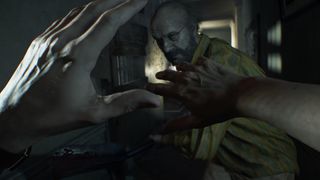
Resident Evil 7 releases next week, and with it comes a new perspective for the venerable survival horror series. The single-player mode be played entirely in first-person, and the emphasis on scares and puzzles also marks a return to the series' roots. But why did Capcom decide to abandon the escalating action focus of more recent Resident Evil games in favour of tension and resource scarcity? In a new GameSpot documentary, several developers said that after Resident Evil 6 it felt like it was time to dial things back.
"After our sixth Resident Evil, we got a lot of feedback from fans," executive producer Jun Takeuchi said. "I think a lot of [people] loved the game. Of course at the same time, we know there's feedback that people thought we're going too far down the road of action horror rather than survival horror.
"That was great timing because, internally, we also felt, this is the time for us to just take a step back and re-evaluate what survival horror means to us and what Resident Evil means to us."
At Capcom, several developers including director Koshi Nakanishi felt it was time to look at the series and try to figure out what makes a Resident Evil game. Series producer Masachika Kawata noted how the directors of Resident Evil 4 completely changed the series' formula by throwing out all preconceived notions of what the series is and going with something new. More than 10 years later, Kawata says Capcom wanted to go with that approach again.
Despite going back to the series' roots, Kawata said that adopting the first-person perspective delivers a "heightened immersion" to the horror. Takeuchi said that "going back to [its] roots wasn't synonymous with just turning back the clock on gameplay systems or choices of camera systems."

"The most natural evolution in my mind was how do I get [players] to feel this direct sense of fear and atmosphere of the fact that this character is very much in danger?" he said. "For me, first-person perspective was a very natural fit for the future of survival horror while remaining true to the series roots."
During the time between Resident Evil 6 (2012) and now, independent developers have taken the horror genre in new directions. Games like Outlast, Amnesia, and Slender revitalized a genre that had become more action-packed than scary with games like Dead Space 3 and Resident Evil 5.
PC Gamer Newsletter
Sign up to get the best content of the week, and great gaming deals, as picked by the editors.
Takeuchi said that it's been a "positive experience" watching these indie horror games rise to popularity, but he believes that there aren't many games that are truly like Resident Evil. His reason? It's a survival horror game, while many indie titles are purely horror. The difference, he explained, is that horror games are focused on how much they can scare the player, while games like Resident Evil want to scare you, but also give you the means to fight back.
"Even with limited sources, you're going to be able to face your fears and overcome them at some point."
The full GameSpot documentary talks more about how the original Resident Evil influenced future developers and how Capcom is reinventing the series. You can watch all of it here. Resident Evil 7 launches on January 24. For more on Resident Evil, check out our story on how Dead Space would have been System Shock 3, if not for Resident Evil 4.
On top of that, we recently ranked all the Resident Evil games on PC, from worst to best. Check that out, and make sure to tell us why we're wrong in the comments.
Most Popular







